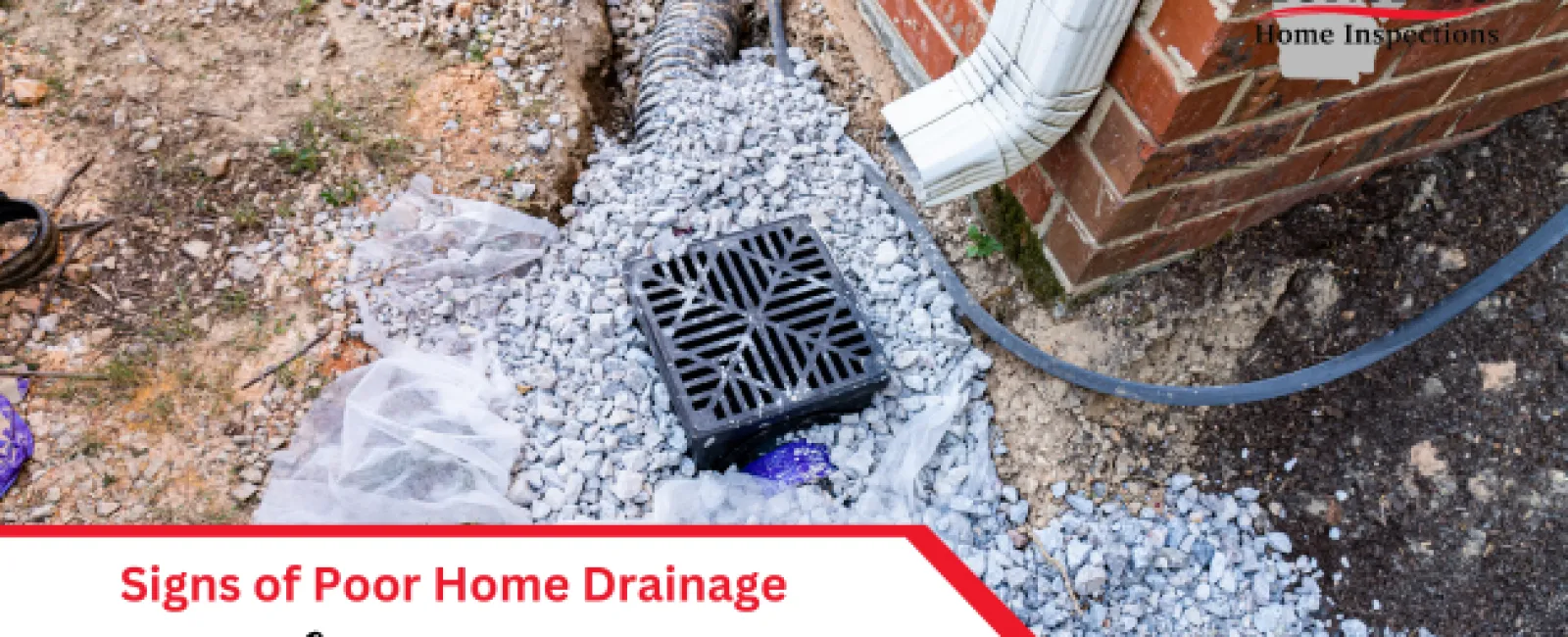Poor home drainage is one of the most commonly overlooked yet potentially damaging issues for homeowners. In regions like Carolina, where seasonal rainfalls and humid climates can intensify drainage issues, a home's drainage system must function effectively to protect its foundation, landscaping, and indoor air quality. Ignoring the signs of poor drainage can lead to significant and costly problems, including structural damage, mold growth, and even health issues caused by mold and mildew buildup.
LunsPro Inspection Group, known for its expertise in Carolina residential and commercial home inspections, offers comprehensive evaluations to help homeowners identify and correct drainage issues. In this article, we'll explore the telltale signs of poor home drainage, discuss why they're problematic, and outline actionable solutions to fix these issues. Understanding and addressing these symptoms can save homeowners from costly repairs and maintain the health and longevity of their properties.
Why Proper Home Drainage is Essential
Good drainage directs water away from your home's foundation, landscaping, and basement or crawl space areas. Without it, water accumulates, seeps into cracks, and can cause structural damage over time. Poor drainage can also lead to basement flooding, erosion, and moisture buildup inside the home, which can encourage mold growth and compromise indoor air quality.
For Carolina homeowners, ensuring proper drainage is even more essential, as the area's humid climate and seasonal rain can exacerbate drainage issues. Carolina residential and commercial home inspections frequently uncover drainage-related problems that, if caught early, can prevent much larger and more expensive issues.
Key Signs of Poor Home Drainage
Identifying drainage issues early is crucial, and there are several common signs that indicate poor drainage around your home. Here's what to look out for:
1. Pooling Water Near the Foundation
One of the most obvious signs of drainage problems is standing water near your home's foundation. After heavy rain, water should naturally flow away from your house. If it pools around the foundation, it may be due to poor grading or blocked drainage systems. Over time, standing water can erode the foundation, lead to basement leaks, and create a breeding ground for pests.
2. Basement or Crawl Space Moisture
Moisture in basements or crawl spaces is often due to poor drainage. Damp walls, musty odors, and water stains are strong indicators. Left untreated, excess moisture in these areas can lead to structural damage and mold growth, which is hazardous to health and can damage Carolina home appliances in basement or crawl space storage areas.
3. Cracks in the Foundation
Small cracks in the foundation are often harmless, but wider or more significant cracks, especially ones that worsen over time, can signal poor drainage. When water repeatedly accumulates around the foundation, it weakens the soil structure and can cause shifting or expansion, leading to cracks that weaken the foundation.
4. Soggy or Eroded Landscaping
Excess water can saturate the soil in landscaped areas, leading to soil erosion, plant damage, and unattractive, waterlogged spots. If water collects in specific areas and doesn't drain, it can drown plants and erode topsoil, destabilizing tree roots and other parts of your yard.
5. Overflowing Gutters or Downspouts
If gutters or downspouts regularly overflow or don't direct water away from your home, this could indicate a blockage or design flaw in your gutter system. Clogged gutters force water to cascade down your walls, leading to soil erosion, foundation issues, and damage to exterior siding.
6. Indoor Mold and Mildew
Poor drainage can also manifest indoors as mold or mildew. If you're noticing a musty smell, black spots on walls, or discoloration in carpeted areas, this may be due to water seepage from poor drainage outside. Excess indoor moisture can lead to respiratory health issues and must be addressed promptly.
How to Fix Poor Home Drainage
If you're experiencing any of these symptoms, there are several effective solutions available. Here are some common and proven fixes for poor home drainage.
1. Regrade the Landscape
In many cases, regrading the yard to ensure a slope away from the house is a primary solution. Proper grading ensures that water flows away from the foundation, reducing the risk of pooling. Generally, the land should slope about 6 inches within the first 10 feet away from the home's foundation. This can be done by adding soil around the foundation and creating a gentle slope.
2. Clean and Maintain Gutters and Downspouts
Maintaining your gutter and downspout system is critical for directing water away from your home. Clean your gutters regularly to prevent clogs, and check downspouts to ensure they extend far enough to carry water away from the foundation. Installing downspout extensions or splash blocks can further help guide water away.
3. Install a French Drain
French drains are highly effective solutions for homes with recurring drainage problems. A French drain consists of a gravel-filled trench with a perforated pipe that redirects water away from trouble areas. It's particularly useful in yards with heavy clay soil that holds water or for homes that experience regular basement flooding. LunsPro Inspection Group's Carolina residential and commercial home inspections often recommend French drains for properties with serious drainage concerns.
4. Use Dry Wells or Rain Gardens
For yards with excess water that doesn't easily drain, dry wells or rain gardens are effective solutions. A dry well is an underground structure that collects runoff water and allows it to disperse slowly into the ground. Similarly, a rain garden is a landscaped area designed with plants that thrive in wet conditions and can absorb large amounts of water.
5. Install a Sump Pump
For basements or areas prone to flooding, a sump pump is essential. The sump pump activates when water accumulates in a sump basin, pumping water out and away from the home's foundation. Carolina home appliances like sump pumps are highly effective in areas with heavy rainfall or high water tables, where drainage issues are persistent.
6. Seal Foundation Cracks
Addressing foundation cracks as soon as they appear can prevent water seepage and further damage. Seal small cracks with hydraulic cement or waterproofing sealant. For larger or widening cracks, consider professional help to ensure the foundation's stability.
7. Improve Indoor Ventilation and Dehumidification
For homes dealing with indoor moisture, improving ventilation can make a significant difference. Use exhaust fans in bathrooms and kitchens and consider using a dehumidifier in damp spaces like basements. By controlling indoor humidity, you can prevent mold and mildew buildup.
The Importance of Professional Inspections
While DIY solutions can be effective, significant drainage issues often require professional attention. Carolina residential and commercial home inspections, like those offered by LunsPro Inspection Group, provide homeowners with a thorough evaluation of their drainage systems. Inspectors have the experience to identify subtle signs of poor drainage and can recommend customized solutions based on your property's layout and specific needs.
Proper drainage is essential to maintaining a healthy and stable home. Addressing drainage issues promptly not only protects your property but also safeguards against mold, structural damage, and other serious problems. By recognizing the signs of poor drainage and taking corrective action, Carolina homeowners can prevent costly repairs and ensure a safe living environment.
With solutions ranging from regrading landscapes and installing French drains to maintaining gutters and sealing foundation cracks, there are various ways to improve home drainage effectively. For peace of mind and comprehensive guidance, rely on professionals like LunsPro Inspection Group, a trusted name in Carolina residential and commercial home inspections, who can help identify and resolve drainage issues before they become costly disasters. Proper drainage is an investment in the longevity of your home, ensuring it remains a secure and comfortable space for years to come.

